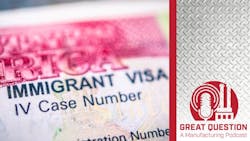Podcast: How manufacturers can prepare for ICE enforcement
What you'll learn:
- Manufacturers must proactively track employees’ immigration status to avoid compliance issues.
- Increased audits make self-audits and I-9 reviews essential for workforce readiness.
- E-Verify alerts are helpful but do not guarantee protection from enforcement actions.
- Staffing shortages may occur due to stricter enforcement of immigration laws.
You’ve seen the high-profile raids of U.S. manufacturing facilities by federal immigration agents. These likely are just the beginning—labor and immigration attorney Jorge Lopez tells Senior Editor Laura Putre of IndustryWeek, Smart Industry’s sister brand, in this episode of Great Question: A Manufacturing Podcast.
See also: How digital transformation and AI can redefine supply chains
“I think we did a survey, and about 83% of all manufacturing respondents were concerned about immigration having an actual effect on their processes,” Lopez told Putre.
“And I think if there's one area where it's going to be focused, it’s really compliance work—whether or not the workforce may be interrupted and continue to be lawfully employed.”
Increased federal funding for Immigration Customs Enforcement agents still hasn't hit the agency and won't have a measurable impact on staffing there for months, so look for a much more prominent role for ICE that shown so far in enforcement and the news going forward.
See also: How can manufacturing survive and thrive in the tariff era?
So, expect site visits and raids to increase in the fourth quarter of 2025 and especially in the first half of 2026, Lopez says.
He also offers advice on how to prepare your paperwork for federal investigations, what companies are (and are not) obligated to provide, and how to limit legal exposure for your manufacturing operations.
Below is an excerpt from the podcast:
About the Podcast
Great Question: A Manufacturing Podcast offers news and information for the people who make, store, and move things and those who manage and maintain the facilities where that work gets done. Manufacturers from chemical producers to automakers to machine shops can listen for critical insights into the technologies, economic conditions, and best practices that can influence how to best run facilities to reach operational excellence.
Laura Putre: Can you tell us a little bit about the type of immigration work that you do?
Jorge Lopez: Sure. I basically exclusively represent management. I'm a corporate immigration attorney dealing with all sorts of issues for companies—HR issues, policies, visas, compliance work. I do a lot of compliance work.
See also: ‘Cobots’ drive production, cost efficiency in manufacturing of lifesaving pharmaceuticals
LP: I'm wondering, what recent changes in immigration policy and law should manufacturing executives and employers be aware of?
JL: That's a good question. I mean, do you have a couple of hours? Because really it is something that’s on the mind of many folks, particularly in manufacturing.
I think we did a survey, and about 83% of all manufacturing respondents were concerned about immigration having an actual effect on their processes. And I think if there's one area where it's going to be focused, it’s really compliance work—whether or not the workforce may be interrupted and continue to be lawfully employed.
The big issue right now for most employers across the board, including manufacturing, is not just whether somebody is properly documented, but whether they will retain that proper documentation to continue being employed. That creates all sorts of issues for clients and companies.
Podcast: Why IT and OT remain out of sync and how manufacturers can bridge that gap
LP: When you say retain, what do you mean? What are the issues around retaining their immigration status that have come up?
JL: What's going on right now is that there has been an aggressive effort by the administration to re-evaluate many programs where individuals had lawful status to be in the United States.
Whether it's the parole program for Haitians, Cubans, Nicaraguans, Venezuelans, or whether it's Venezuelan TPS, Nepalese TPS, or Honduran TPS, those scenarios are situations where folks have had lawful status for a number of years and now, unfortunately, as a result of recent changes in administration policy, they have lost that authorization. That means employers need to let go of that workforce.
LP: Are there any other visa concerns in addition to TPS, would you say?
JL: I think the visa concerns deal with the part of the workforce that may be visa-dependent—meaning there are certain employment-authorized visa statuses that allow you to work based on sponsorship by a company.
In manufacturing, we usually see that in the engineering and quality control areas. In those scenarios where there is sponsorship, there may be more restrictive review of those applications, which could create problems for employers in that area.
See also: Sensing a shift: Trends in smart industrial automation
LP: Are you seeing an increase in audits? And what can manufacturers do to prepare for that possibility?
JL: We have. You know, when the Trump administration first took effect in January of this year, there was a lot of talk and concern about raids. And the concept of raids—I no longer use the word raid, I use the word site visits, okay? Because really it reflects better what's going on.
And site visits basically could be one of two things. It could be an I-9 audit, which is, I think, the easy pickings and the easy way of doing enforcement activity, because it doesn't cost the government a lot of money. An I-9 raid really involves enforcement, reviews, investigations, getting a warrant issued by a federal judge. And those take time and money and effort.
See also: ‘Digital retrofitting’ of plant machines offers course through Industry 4.0 to Industry 5.0
An audit, on the other hand, is you come in, you present yourselves with a three-day notice. You come back, and depending on whether you come back in three days or a little bit longer—depending on what's been negotiated with the special agent in charge of the investigation—you then deal with production of information.
So, we are seeing an increase in audits. I think one of the key things going on is that the $165 billion issued to DHS—which is one of the more heavily funded agencies now in the federal government—about a little over $150 billion is going to be exclusively related to immigration enforcement. About $30 billion is immigration enforcement, and $45 billion is going to be for detention facilities.
About the Author
Scott Achelpohl
Head of Content
I've come to Smart Industry after stints in business-to-business journalism covering U.S. trucking and transportation for FleetOwner, a sister website and magazine of SI’s at Endeavor Business Media, and branches of the U.S. military for Navy League of the United States. I'm a graduate of the University of Kansas and the William Allen White School of Journalism with many years of media experience inside and outside B2B journalism. I'm a wordsmith by nature, and I edit Smart Industry and report and write all kinds of news and interactive media on the digital transformation of manufacturing.

